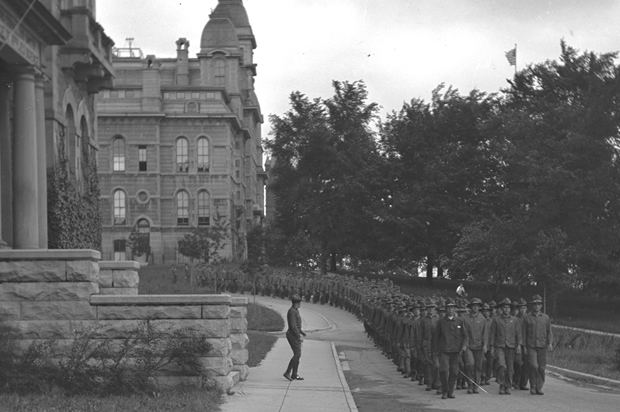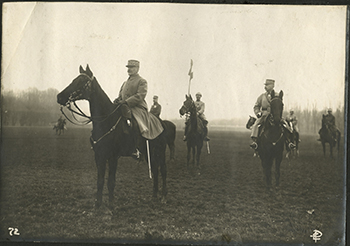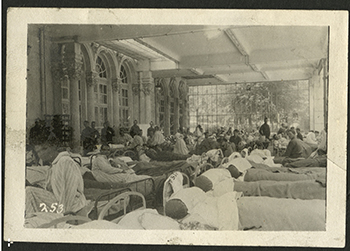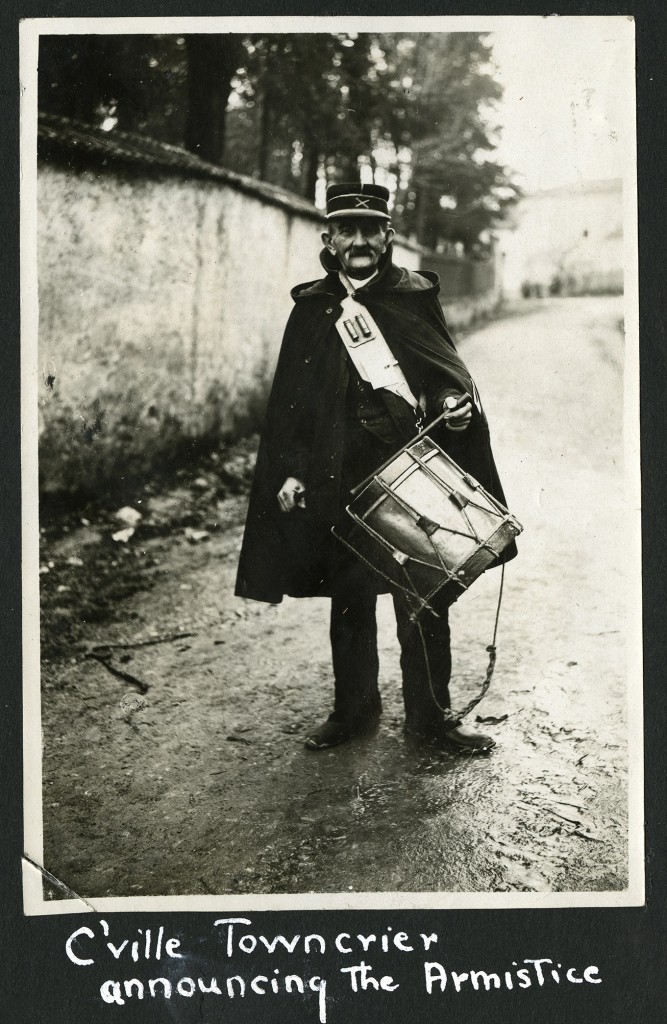When Did the International Economy Collapse in Y How Did Science and Art Developed After World War 1

In this photo, circa 1918, the Students' Army Training Corps marches in germination by the Hall of Languages. This is one in a collection of photos from Syracuse University Archives that show WWI activity on campus.
It was called the Slap-up War and the war to end all wars.
One hundred years afterwards, the chaos and consequences of World War I, which began on July 28, 1914, when Republic of austria-Hungary declared war on Serbia, had repercussions that continue to resonate in today'due south world. David H. Bennett, Meredith Professor and professor emeritus of history at the Maxwell School and the Higher of Arts and Sciences, discusses insights of a century on and the state of war'south lingering effects.
Q: What were some of the biggest impacts of World State of war I?

Meredith Professor and Professor Emeritus David H. Bennett
A: It changed the world. It led to the Russian Revolution, the collapse of the German Empire and the collapse of the Hapsburg Monarchy, and it led to the restructuring of the political social club in Europe and in other parts of the earth, peculiarly in the Middle Eastward.
It resulted in, inevitably, World War II and some other revolution in Germany, which brought Hitler to ability. He was dedicated to the proposition that he would wipe away the "stain of Versailles," which was the peace briefing after the state of war.
The war also affected consciousness. It shattered the secure, ordered life of Edwardian England, and people said after the state of war that the aforementioned sense of stability would never be there again. "The lamps are going out all over Europe, we shall not see them lit again in our life-time," British Lord Grey said.
The war brought about such bitterness about the nature of war because information technology went on for so long and had enormous casualties—for example, the French had one.39 1000000 military machine deaths in a nation of 40 million and the British had near 800,000 dead.
So when Hitler began to rearm Europe, instead of responding, the British and French wanted to avoid disharmonize at all costs. At that place are other reasons why they did that. For example, some European leaders had such a fear of the Soviet Union that they saw Hitler's Germany as a bulwark against the spread of hated communism. But the casualties listing in the Keen War was a major reason for appeasement.
Q: How was the Us shaped by the war?
A: The response to the state of war in the United States was resentment about what many people experience was a failed peace endeavor at Versailles. The president of the U.s.a., Woodrow Wilson, promised this would be a state of war to terminate all wars and would be followed with a peace without victory. To many Americans, especially many indigenous groups, German-, Irish- and Italian-Americans, information technology looked like a victor'due south peace because and then many people in Federal republic of germany, Italy and Ireland were unhappy most the peace treaty.

French Marshal Ferdinand Foch, commander of the Allied forces, enters the city of Metz, Deutschland, (afterwards reverted back to French republic after decades of German language occupation) the day after Armistice Mean solar day in 1918. Syracuse Academy medical schoolhouse graduate Edward Due south. Van Duyn (1897), who served at a U.S. Army hospital in France, took the photo later on driving with a colleague past "No-mans Land" and abased German language trenches to reach the urban center. From the Edward Due south. Van Duyn World War I Collection, courtesy of the Special Collections Inquiry Heart at Syracuse University Libraries
The event of the war was America's retreat from the globe, a retreat to isolationism. That'south what Warren Harding meant in his inaugural accost in 1921. He said we needed a return to normalcy, and then the U.Due south. never signed the Treaty of Versailles and never joined the League of Nations, even though information technology was an idea put forward past the American president.
When Hitler was rearming Europe and fascism was spreading, the response inside Congress was to pass the Neutrality Acts to make sure the U.s.a. would not be dragged into another state of war. That's ane of the reasons why state of war broke out in September 1939 and the U.Due south. didn't get involved until it was attacked in 1941.
Q: How are the problems in the Middle East traced back to World State of war I?
A: The war led to the Ottoman Empire's collapse and the establishment of a new invented state, Republic of iraq, created by the British out of Mesopotamia and Kurdish-occupied areas for its oil resources.
The same matter happened in the Middle East, with the cosmos of Syria, Hashemite kingdom of jordan, Lebanese republic and Palestine, which were all function of a great barbecue divided up past the French and British equally spoils of war. The borders had nothing to do with the nature of where the populations lay.
The British promised the Arabs autonomy in their area, and also promised the Jews a national homeland in the Holy Land—both unable to exist fully realized. There were a lot of other reasons why there has been an enormous series of crises in the Heart East, only what happened in WWI was not totally unconnected.
Q: What is the biggest misconception virtually World War I that people may accept?

Patients convalesce within U.Due south. Army Base Hospital #31, which had been transformed from a casino and hotel in Contrexeville, France, during WWI. Syracuse University medical school graduate Edward S. Van Duyn (1897) served at the infirmary during his time as a military machine surgeon. From the Edward S. Van Duyn World War I Collection, courtesy of the Special Collections Research Heart at Syracuse University Libraries
A: Many people don't call back WWI was all that important. Y'all can't run into information technology on national television receiver and there have been few films nigh it. It doesn't look similar a war of adventure or movement, because it was a war of attrition. Later on November 1914, on the main battle lines of the Western Front, there was admittedly no movement for four years.
Because the war is not easily portrayed as a dramatic event, it appears to many people as not all that important. Simply it was immensely significant and the precursor to WWII and many other events.
Q: What exercise you want students to empathise about the Great War?
A: I endeavor to convey to students how important information technology was and how hard information technology is to understand why information technology began. There is enormous historiographical debate still going on today about why WWI started.
What also is interesting, considering I teach military history, is the manner in which the war was fought. The state of war was dominated by defensive weapons, which made information technology impossible for either side to interruption through in one case troops were dug in. That's why it was a killing match, a war of attrition, with enormous weapons and spectacularly high casualty rates.

The town crier in Contrexeville, France, heralds ceasefire and the end of WWI. From the Edward S. Van Duyn World War I Collection, courtesy of the Special Collections Research Heart at Syracuse University
It was the casualty lists and the death toll, including the soldiers who were mutilated in the war, that most predetermined the effect. Information technology would be a victor's peace insisted on past the victors considering they had lost and then much. But it would be received with enormous resentment and anger by the people who had lost the war.
The Germans came within a hair of winning the state of war about until the very end. And the economic, political and social consequences of peace fabricated information technology the fatal prelude to World War 2.
Then when I teach my undergraduate class, "Globe at War: 1914-1918, 1939-1945," they can't really understand the second globe state of war—"the Big One," the one in which the "Greatest Generation" fought—until they understand the first world war.
Source: https://news.syr.edu/blog/2014/07/28/100-years-after-wwi-the-lasting-impacts-of-the-great-war-78831/
Post a Comment for "When Did the International Economy Collapse in Y How Did Science and Art Developed After World War 1"